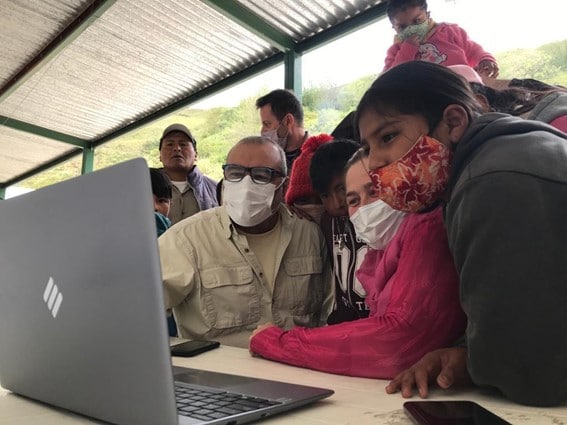SOCIO-HEALTH INNOVATION IN TELEHEALTH IN THE ABORIGINAL COMMUNITY OF MOLULO-QUEBRADA DE HUMAHUACA-JUJUY- ARGENTINA
Since 2019, EXO has been supporting the Digital PHC Project - Molulo, an initiative that was conceived in December 2018 by the then team of the Telemedicine Unit of the Ministry of Health of Jujuy and the National University of Jujuy (UNJu), together with the Dr. Salvador Mazza Hospital in Tilcara, the Federal Network of Telehealth and Remote Communication, Garrahan Hospital, and other actors that joined in, such as the Soldado de la Patria School and the Abortion Community of the Aboriginal Community. Salvador Mazza Hospital in Tilcara, the Federal Network of Telehealth and Distance Communication, the Garrahan Hospital, and with other actors that joined in, such as the Soldado de la Patria School and the Aboriginal Community of Valle de Molulo-Pueblo Kolla; the Fundación Aprendiendo Bajo la Cruz del Sur of Buenos Aires, the company Servicio Satelital S.A. of CABA, the Asociación Amigos de Molulo of Córdoba and the Arturo Jauretche National University.
APS Digital Project - Molulo
In September 2019, the Ministry of Health of Jujuy and the UNJu obtained funding from the Networks Programme of the National Ministry of Health, in the Call for Innovations in Health, with the objective of "Promoting the implementation of Telehealth in the Aboriginal Community of Valle de Molulo-Jujuy and accessibility to health services through Digital Primary Health Care (PHC) actions of the Provincial and National Telehealth Programme".
This project from the Office of Remote Communication (OCD) of the Maternal and Child Hospital of the Jujuy Public Health System has implemented in a participatory manner the layout of the new digital health care routes between the Molulo Health Post and the Tilcara Hospital in the first instance, to then enter the Federal Telehealth Network and OCD; all this within the framework of respect for the rights of the aboriginal communities with due consultation and informed consent by the people of Molulo.
The UNJU, together with the network, has contributed to the management of the project and the development of conceptual and theoretical frameworks for Digital PHC, and EXO has loaned the UNJU and the Tilcara Hospital the Mobile Diagnostic Centre (CDM), a telemedicine solution that allows recording a 12-lead ECG, oximetry (SpO2), non-invasive blood pressure (NIBP) and temperature, and sharing this data remotely in real time, with the possibility of videoconferencing.
Project Start-up
The implementation of this great project, in which EXO has participated, has been challenging. Reaching the Cuarteles-Molulo site has required a great effort to face a long and hard road between hills and mountains, a journey of more than 7 hours on foot and on horseback, where it has been possible to appreciate the immensity and magnificence of the Jujuy territory, with clouds below the road at times, as it reaches 4400 masl and descends to 3100 masl, the height where the School and the Health Post are located as centres of joint operation of the Project.
The majority of the 62 people who make up the aboriginal community of Molulo live approximately 30 minutes, up to 4 hours on foot, from the Primary Health Care Centre (CAP), in rural areas without internet (only the school has internet), with limited access to energy from solar panels (no 220 volts) and with radio as the main means of communication.
EXO has been part of the team that travelled to Molulo, which was composed of Dr. Paz Bossio Referent of Digital Health of the UNJU; Dr. Federico Adén, Head of the Office of Remote Communication (OCD) of the Hospital Materno Infantil and Ing. Cecilia Coria of the Tilcara Hospital; Mg. Magdalena Zurita and Mr. Fernando M. González, Manager of Social Responsibility and Sustainability of the EXO Company; the Ancestral Authority Mrs. Quintina Colque of the Aboriginal Community of the Molulo Valley; and Lic. Gonzalo Berrá, President of Servicio Satelital S.A., and Tec. Elec. Damián Mares, Operations Manager of this company; and Lic. Claudia Gómez Costa, President of the Fundación Aprendiendo Bajo la Cruz del Sur, who provided connectivity support.
It should be noted that this Foundation and the satellite company, since 2009, have been providing internet and facilitating access to connectivity to the School through its antenna and satellite, and on this trip they renewed their commitment with the extension of internet to the Health Post and incorporating the latest generation equipment that significantly expanded the Wifi signal, which allows the community to have internet signal in the radius of the School.
On 15 April, the first connection of the digital PHC care route from Molulo to the Tilcara Hospital and the Maternity and Children's Hospital, of which EXO has been a part, was made. With EXO's Mobile Diagnostic Centre, electrocardiograms were performed on adults and a child, and this health information was forwarded to the hospital, from which a response was received in a short time from the specialist doctors, both from the clinician at the Hospital de Tilcara and the paediatric cardiologist at the Hospital Materno Infantil, and the next health care actions were planned.
On the same day, a Zoom Videoconference was also held, in which EXO took part together with authorities from the National University of Jujuy, the National Directorate of Life Course Management, the National Coordination of Telehealth and Distance Communication, the Networks Programme of the National Ministry of Health and more than 60 nodes of the Federal Telehealth Network.
Project Benefits and Networking
As Olmidio Martínez, the community health worker, comments, "The distance between Molulo and Tilcara means that people cannot access health professionals on a regular basis; in general they go to the city to get supplies and come back, as every time they go to a medical centre the waits are long and sometimes require them to stay overnight" (...) "Having telemedicine allows us to be connected to the Tilcara Hospital and to specialist doctors. Also, the population we have here does not have primary care check-ups, they only go to the doctor if they are very sick. Being able to take these vital parameters with just one device will help to provide accurate and timely diagnoses," Olmidio said.
Olmidio assists the community from the CAP and periodically visits the homes of the families, where he carries out population censuses, also considering the health situation of the homes. He says that only two or three people in the whole community have had electrocardiograms because of health problems, and the rest have never had them. This is why EXO's CDM and the telemedicine system installed in conjunction with it opens up this new opportunity for them, avoiding the need to travel to the main town and the risks that this implies for their agricultural and grazing activities.
In this line, Dr. Paz Bossio, director of the project, emphasised that "it is important to understand that health should be equitable and of quality, that it should arrive on time, and to ensure that people not only ask for a doctor's appointment in case of illness but also for primary check-ups. It is necessary to go out and look for the patient and promote health.
Finally, EXO's Social Responsibility and Sustainability Manager, Fernando González, emphasised that "at EXO we are very grateful to have been part of this great initiative which motivates us to continue expanding our telemedicine solutions in Argentina and the rest of the world".
Today, the Molulo Digital PHC project can be synthesised in a great joint effort of institutional (public-private) and personal wills, constituted in a large network, with the aim of making health digitally accessible to places that previously had limited the exercise of this vital right.


